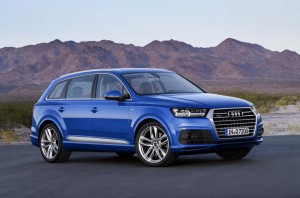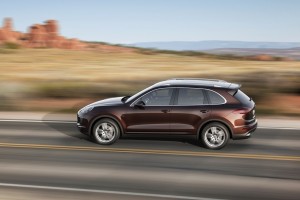Volkswagen and its Audi and Porsche brands have ordered a stop-sale on a wide range of high-end diesel vehicles accused by the Environmental Protection Agency of using hidden software to cheat on emissions tests.
But the German maker contends the code identified by the EPA was not intended to hide pollution problems with the company’s 3.0-liter turbodiesel but actually to further reduce emissions in real-world conditions.
“It’s an auxiliary emissions control device, not the defeat device used in the 2.0-liter diesel,” said Audi spokesman Brad Stertz, referring to the smaller diesel engine used in 11 million vehicles sold worldwide, including 482,000 sold in the U.S. over a seven-year period.
(Click Here for more on the EPA’s latest allegations against VW.)
Volkswagen has acknowledged that it did use a so-called defeat device in those vehicles, subterfuge revealed by the EPA on September 18th. That led to a major shake-up at the automaker, including the ouster of its CEO and a number of other senior executives. The company has now been targeted by hundreds of lawsuits, is under investigation by prosecutors in the U.S. and Germany, and could face billions of dollars in fines.
VW has also put a stop-sale on vehicles like the Passat TDI using the smaller engine. It plans to begin a worldwide recall campaign in January, though repairs for vehicles using the EA-189 engine sold in the U.S. are expected to take longer, as the EPA has not yet approved a proposed fix.
What will happen with vehicles using the larger Gen II 3.0-liter Volkswagen turbodiesel is even less certain, as the carmaker has said it did not violate the law, though it apparently did not provide clear details to regulators on the software strategy it is using to hold down smog-causing oxides of nitrogen.
“We hope to get in front of the EPA,” said Stertz, as well as the California Air Resources Board and Environment Canada, “and explain why the system behaves this way.
VW claims the technology in question is used to heat various parts of the engine, including the system that injects urea, an ammonia-like chemical, into the exhaust to reduce NOx levels. The argument is that it can help hold down emissions when the engine is cold.
Observers say it is not a surprise that regulators would be skeptical considering VW attempted to conceal pollution problems with its smaller diesel for at least seven years. And the maker this week revealed that an internal audit has uncovered “irregularities” in the emissions of 800,000 other vehicles sold around the world in recent years. For the first time, that includes some gas-powered models, as well as diesels.
(VW finds irregularities with 800,000 more cars. For more, Click Here.)
But diesels are a particular headache for automotive engineers because they naturally produce higher levels of NOx and sooty particulates than gas engines.
For the time being, VW has told dealers to stop selling a wide range of used and new vehicles equipped with its 3.0-liter diesel. That list includes:
- Volkswagen Touareg TDI SUVs, both new and certified pre-owned, from the 2013 to 2016 model-years;
- New and certified pre-owned Audi Q7 TDI SUVs from the 2013 to 2015 model-years;
- New and certified pre-owned Audi A6, A7, A8, and Q5 TDI models from the 2014 to 2016 model-years;
- New and certified pre-owned Porsche Cayenne TDI SUVs from the 2014 to 2016 model-years.
The impact of the latest stop-sale could be significant. The Cayenne is Porsche’s best-selling product line and the diesel version accounts for 30% of the SUV’s U.S. sales. Diesels make up a growing share of the sales of the other models the move covers. Overall, diesels account for about 25% of Volkswagen’s U.S. volume. It is the nation’s biggest seller of diesels.
But the latest controversy could further hurt the image of the automaker and impact sales of gasoline-powered vehicles. VW brand sales were virtually flat in October despite the double-digit increase in the overall American market.
(VW sales starting to feel the pinch. Click Here for more.)
Audi actually outpaced the industry, with sales up 16.8%, but it was only marginally impacted by the original diesel cheating scandal. That involved one slow-selling model, the compact A3 TDI. The latest EPA allegations could have a broader impact on Audi, according to several industry observers.
If VW cannot convince the EPA that it was using a legitimate software strategy, the company could face another $375 million in penalties for violating the U.S. Clean Air Act. It already is liable for penalties of $18 billion for the problems with the 2.0-liter diesel. And that doesn’t include possible fines that could be levied by the U.S. Justice Department. Meanwhile, VW is facing more than 300 lawsuits linked to the initial diesel scam.



It sounds to me like the EPA got it wrong on the 3.0L V-6 diesels and now they will do everything they can to convince the media that VW cheated on these engines to save face. The EPA has never claimed the VW 3.0L V-6 diesels failed to meet emissions at any time so their argument is suspect at this point. What the EPA describes sounds like a very typical exhaust emissions cleaning cycle used to improve CAT operation.
If this turns out to be the case and VW has done no wrong on the 3.0L V-6 diesel engines it should be interesting to see if the EPA will admit they are wrong and that they have inappropriately compromised VW’s rep even more while hurting consumers as well as VW, Audi and Porsche dealers. With VW disclosing that they found irregularities on 800,000 more vehicles, it appears to me that they are being transparent and that they are checking all of their engines and data. Time will tell but it certainly looks like the EPA got this deal wrong from what I have read.
Paul, it looks like you missed the comment I posted a week ago on the 3.0L VW V6 diesels.
Paul – Why does the original comment I posted here a week ago still show “waiting for moderation”?
It’s listed below again.
“GT101 says:
Your comment is awaiting moderation.
at http://www.thedetroitbureau.com/2015/11/vw-porsche-audi-order-stop-sale-on-high-line-diesels/#comments
It sounds to me like the EPA got it wrong on the 3.0L V-6 diesels and now they will do everything they can to convince the media that VW cheated on these engines to save face. The EPA has never claimed the VW 3.0L V-6 diesels failed to meet emissions at any time so their argument is suspect at this point. What the EPA describes sounds like a very typical exhaust emissions cleaning cycle used to improve CAT operation.
If this turns out to be the case and VW has done no wrong on the 3.0L V-6 diesel engines it should be interesting to see if the EPA will admit they are wrong and that they have inappropriately compromised VW’s rep even more while hurting consumers as well as VW, Audi and Porsche dealers. With VW disclosing that they found irregularities on 800,000 more vehicles, it appears to me that they are being transparent and that they are checking all of their engines and data. Time will tell but it certainly looks like the EPA got this deal wrong from what I have read.”
UPDATE: 11-11-15 The EPA did in fact get it completely wrong on the VW 3.0L V6 diesel engine which according to the German motor authority KBA, there is no “defeat device” or other illegal software in these VW 3.0L V6 diesel engines, contrary to what the EPA has claimed.
Not sure how I missed the original. Now approved.
Meanwhile, see the reference to what the VW system on the 3.0-liter supposedly does…heating up the exhaust system, apparently including the urea, to improve low-temp emissions.
That said, VW’s credibility is so shot that I think the EPA will need be conclusively shown that there is no subterfuge here. If that be the case, however, the agency will owe VW a big apology.
Paul E,
Paul-
I don’t think you understand what the VW auxiliary CAT high temp cleaning process does. It lowers emissions and is fully legal and used by many in the auto industry. VW chose to use this as a supplemental operation to lower cold start up emissions where other companies do not use it on cold start-ups, they just use it periodically and thus the other diesel engines emit more pollutants on cold start-ups than the VW 3.0L V6 diesel. This makes the VW 3.0L V6 diesel engine cleaner and better for the environment than the other diesel engines. There is absolutely no violation of U.S. emissions regs nor a “defeat device” on the 3.0L VW V6 diesel engines according to various industry experts who have investigated this engine.
At no time has the EPA ever claimed the VW 3.0L engine failed to meet all emissions requirements. VW went above and beyond to lower emissions and the clueless talking heads at the EPA are in deep trouble now over their screw up on the 3.0L V6 diesel “defeat device” allegations because there is no “defeat device”. VW did not lose any credibility at all because they told the truth. The EPA has lost serious credibility as the German motor authority KBA investigated the VW 3.0L V6 diesel engine and found no “defeat device” and no illegal software code – just as VW previously advised the EPA.
You can bet the EPA will do whatever they can to escape liability for their negligence regarding these false allegations on the 3.0L V6 diesel engine but it’s going to cost the EPA dearly for their negligence and incompetence in this matter and it should. The gross incompetence displayed by the EPA in this matter is inexcusable and totally unprofessional.